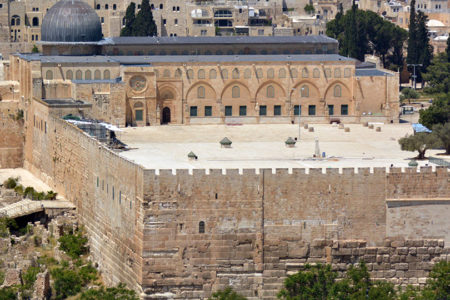Nineveh’s National Revival
Jonah 3:1–10
The Bible abounds with accounts of God’s judgment. In His righteousness and holiness, He destroys both individuals and nations that are saturated with sin. But He also tells us plainly, “I have no pleasure in the death of the wicked, but that the wicked turn from his way and live” (Ezek. 33:11). Jonah 3 is a monument to the goodness and grace of God, who restored His disobedient prophet to a position of service and extended mercy to a nation that truly repented.
Jonah’s three-day experience in the belly of a fish brought him to a place of rededication. After being spewed out onto dry ground, he was ready to listen and obey the Lord. God wanted Jonah to fulfill the call He had given to him; and in His marvelous grace, He gave the prophet a new opportunity to do so.
Recommissioning of Jonah
Now the word of the Lᴏʀᴅ came to Jonah the second time, saying, “Arise, go to Nineveh, that great city, and preach to it the message that I tell you.” So Jonah arose and went to Nineveh, according to the word of the Lᴏʀᴅ. Now Nineveh was an exceedingly great city, a three-day journey in extent (3:1–3).
The Lord commanded Jonah, “Arise, go” (v. 2). The prophet was now ready to serve. He immediately “arose and went to Nineveh” (v. 3). His journey from Israel to Nineveh was approximately 500 miles and would take almost a month.
Originally, God had called Jonah to “cry out” against Nineveh because of its wickedness (1:2). But when he arrived there, the prophet was instructed to “preach” the message that God would give him (3:2).
Nineveh was an “exceedingly great city” in many ways (v. 3). It was great in size, in population (at least 600,000 people), and in sin. But above all, it was great in importance before God.
Described as “a three-day journey in extent,” Nineveh was so large it took three days to travel from one end to the other. Built by Nimrod on the banks of the Tigris River between 5000 and 4000 B.C., it was the capital of Assyria and stretched some 2.5 miles along the Tigris. Its walls were 50 feet high and thick enough to accommodate three chariots side by side. Fifteen gates provided entrances to the city. Greater Nineveh actually consisted of many municipalities, but its exact size is uncertain.
Revelation of Judgment
After arriving at Nineveh, Jonah wasted no time boldly proclaiming God’s message: “And Jonah began to enter the city on the first day’s walk. Then he cried out and said, ‘Yet forty days, and Nineveh shall be overthrown!’” (v. 4). The text does not say that Jonah started preaching after he walked a day’s journey into the city, but that he began to preach the very first day he arrived.
Scripture’s account of Jonah’s message is brief and concise: “Yet forty days, and Nineveh shall be overthrown!” (v. 4). The proclamation sent shock waves through this great city, as the people reflected on the prophet’s words and their own wickedness. The phrase forty days told the Ninevites of their divine appointment with destiny: God was going to pour out His wrath on them and destroy their great city.
The number 40 in Scripture is not arbitrary. Frequently it is associated with a time of probation and testing. The Lord was giving the Ninevites 40 days to reflect on their ways and repent of their sins. Their refusal to heed Jonah’s message would mean their demise.
The word overthrown was also used to describe the destruction of Sodom and Gomorrah (Gen. 19:25; Jer. 20:16; Lam. 4:6). In Hebrew, it can mean either “to overturn” or “to turn around.” Here there is a play on words: Nineveh could either turn around through repentance or be overturned like Sodom and Gomorrah.
Jonah must have preached of Nineveh’s destruction with fervor and great passion, wanting the city to receive the judgment he thought it deserved. Why? The Ninevites were notorious for their idolatry, immorality, and violence and for the shameful atrocities they committed toward those they conquered. Their cup was now full, and in 40 days God would destroy them.
Response to Jonah’s Preaching
Luke wrote, “Jonah became a sign to the Ninevites” (Lk. 11:30). Although Jonah’s message was brief and concise, in some way Jonah was a sign to the people of Nineveh; and they knew immediately the prophet’s message was from God.
How was Jonah a sign? Some believe the fish’s gastric juices had so dramatically altered Jonah physically by bleaching his skin and hair white that his appearance alone sent a message to Nineveh. However, there is no indication of this in Scripture. Others believe that Jonah’s preaching, although not recorded, must have included his experience with the fish. Still others believe that, even if Jonah did not mention the story of his survival, it must somehow have reached Nineveh.
What we know for sure is that the sign was tied to Jonah’s survival for three days in the fish’s belly. Jesus Himself validated the story of Jonah by using him as a sign of His own resurrection, which would occur after the Savior spent three days and nights in the grave (Mt. 12:39–40). How Nineveh received the sign of Jonah is uncertain. The story of his survival may have helped people believe the prophet’s message was from God. What is certain is that Jonah’s preaching pierced the hearts and souls of the Ninevites through the power of the Holy Spirit.
Nineveh’s response was immediate and electrifying: “So the people of Nineveh believed God, proclaimed a fast, and put on sackcloth, from the greatest to the least of them” (Jon. 3:5).
Nineveh responded in four ways. First, “Nineveh believed God.” The Hebrew says, “believed in God.” This means they recognized Jonah as God’s messenger, believed Jonah was speaking God’s Word, believed Jonah’s God had the power to destroy them, and personally trusted in God to show them mercy and deliverance.
Second, their trust led them to initiate a fast. Fasting in ancient times frequently was used to mourn over one’s sin. Abstaining from food and drink was seen as a sign of afflicting one’s soul to assuage God’s anger and judgment with the hope of avoiding divine wrath and destruction.
Third, the people put on sackcloth—a rough, coarse material made from goat or camel hair, which was worn next to the body—as a sign of their self-affliction, humility, and repentance. The goal was to abase themselves before God in hope that He would acknowledge their contrition, withdraw His wrath, and show them mercy and deliverance.
Fourth, everyone in Nineveh was made to put on sackcloth and fast, from the “greatest to the least.”
News of this citywide repentance reached Nineveh’s king. Scripture does not identify him, but most likely he was one of two kings who ruled during the reign of Jeroboam II (793–753 B.C.) in Israel: either Adadnirari III (810–783 B.C.) or Assurdan III (771–754 B.C.). Many commentators embrace the latter.
Regardless of who he was, upon hearing Jonah’s message he arose from his throne, laid aside his royal robe, covered himself with sackcloth, and sat on a pile of ashes in humble repentance before God (v. 6).
The king also issued a royal proclamation:
Let neither man nor beast, herd nor flock, taste anything; do not let them eat, or drink water. But let man and beast be covered with sackcloth, and cry mightily to God; yes, let every one turn from his evil way and from the violence that is in his hands. Who can tell if God will turn and relent, and turn away from His fierce anger, so that we may not perish? (vv. 7–9).
The king’s royal decree contained four commands to the city. First, it declared a fast for all living creatures; even animals were made to participate in sorrow over sin. The bleating and bellowing of innocent animals were seen as pleas for mercy, symbolic of the city’s general humiliation.
Second, both people and animals were to be covered with sackcloth. Earlier we saw that all the people put on sackcloth; but now the king decreed that even the animals should be covered with it. Covering animals was often practiced as a sign of mourning at the death of great men.
Third, the city was to “cry mightily to God,” that is, to cry loudly, earnestly, and with urgency.
Fourth, the king’s decree called on every individual within the nation to turn from his “evil way” and from “violence.” Not only did the edict require repentance, but it also required the nation to reform its conduct. The people of Nineveh could earnestly humble themselves before God; but if they did not reform their conduct, God’s judgment would still befall them.
The king and his nobles hoped their actions would move God to have mercy on them: “Who can tell if God will turn and relent, and turn away from His fierce anger, so that we may not perish?” (v. 9). The king knew that fasting and prayer could never assure God’s forgiveness, but he hoped God would acknowledge the sincerity of their repentance and stay His judgment—a hope also expressed by the pagan sailors who had reluctantly thrown Jonah overboard to calm the sea (1:6, 14).
Relenting of Judgment
God acknowledged the genuineness of the Ninevites’ repentance: “Then God saw their works, that they turned from their evil way; and God relented from the disaster that He had said He would bring upon them, and He did not do it” (v. 10).
The Hebrew word for “relented” means to have a change of mind. Thus, in seeing Nineveh visibly turn from its evil ways, God had a change of mind about destroying the city. The Lord rescinded His judgment and spared the city.
Verse 10 gives us a number of principles concerning God’s judgment: (1) The Lord longs to extend grace, not judgment, to people who forsake sin. (2) Even though a nation’s judgment may be imminent, God will give that nation time to turn from sin. (3) God does hear those who intercede for a nation and will act on their prayers of genuine repentance. (4) God will withhold the judgment He has planned for a nation when that nation turns from its evil ways (Jer. 18:8).
God is not to be trifled with. As is written in the book of Hebrews, “It is a fearful thing to fall into the hands of the living God” (10:31). But God is also merciful and often gives us opportunities to repent and obey.
Jonah also teaches us that God’s spokesmen must speak the Lord’s Word, not their own, and that God even extends His love and grace to cruel and godless nations in hope that they will turn from their evil ways. He stands ready to forgive and spare both individuals and countries. But if repentance does not come, His holiness demands that He judge sin.
Individuals and nations would do well to heed the lessons taught by the prophet Jonah and to remember that “the goodness of God leads you to repentance” (Rom. 2:4).








Dear David,
This is a Brilliant explanation. Thank you!
Marie